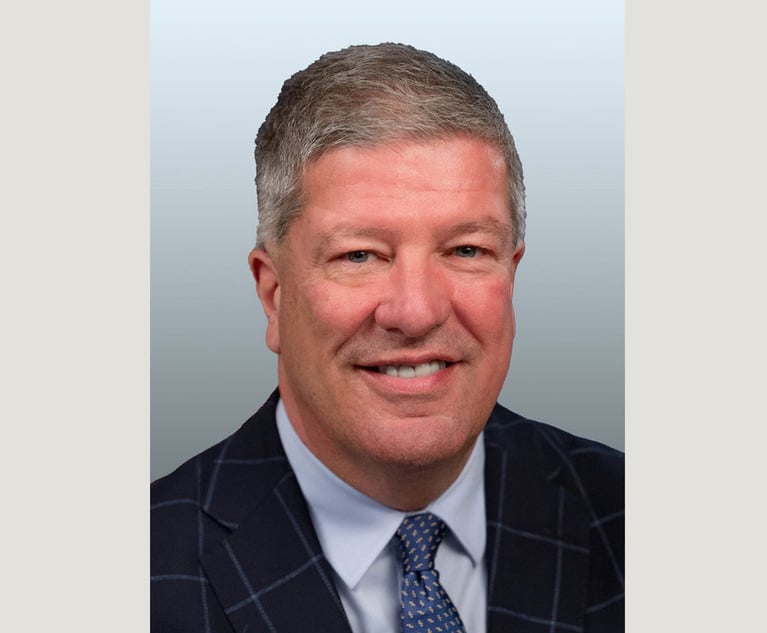State Farm Escapes Bad-Faith Suit Over UIM Coverage
A federal judge has tossed out a bad-faith case over underinsured motorist coverage against State Farm, calling it a re-packaged version of the same issues that had already been resolved.
October 05, 2017 at 05:27 PM
3 minute read

A federal judge has tossed out a bad-faith case over underinsured motorist coverage against State Farm, calling it a re-packaged version of the same issues that had already been resolved.
In Ridolfi v. State Farm, U.S. Magistrate Judge Martin C. Carlson of the Middle District of Pennsylvania granted State Farm's motion to dismiss Tracey Ridolfi's common law bad-faith claims against the insurance company, finding she had already been unsuccessful in bringing statutory bad-faith claims.
“The renewal of this bad-faith claim in the guise of a contractual bad-faith claim in our view runs afoul of the law of the case doctrine in this case where we have already rejected a factually identical statutory bad-faith claim,” Carlson said in his opinion issued Oct. 5.
Ridolfi's car was hit by an underinsured motorist in 2008. According to Carlson's opinion, she opted to settle the case with the underinsured driver's insurance company for $85,000, less than her $100,000 policy limit.
She sued State Farm in 2013 for the $50,000 to $100,000 policy limit. Carlson said her policy limit was actually $100,000 to $300,000, and State Farm offered $200,000. However, Ridolfi and her husband then demanded $700,000.
“We are provided with no new evidence which would compel a different result here. Instead, the evidence seems to continue to show that State Farm gave the Ridolfis greater insurance coverage than they requested at a reduced premium rate, but briefly misstated the scope of that coverage, describing the coverage as that initially sought by Ridolfi and not as the higher level of coverage actually provided by this insurer,” Carlson said.
“When this discrepancy was brought to its attention, State Farm promptly reformed its policy to provide the Ridolfis with that greater level of coverage and potential recovery,” he continued.
Carlson concluded, “As a factual matter there is simply nothing about the fact that State Farm provided greater coverage to Ridolfi than that requested, or paid for, by the plaintiff which would permit an inference of bad faith.”
And while the plaintiff complained of delays in the claims process, Carlson said she was not entirely without fault.
“Once this claim was made by Ridolfi's counsel, the parties engaged in an on-going process aimed at attempting to resolve this claim. These efforts were unsuccessful but that lack of success, standing alone, does not demonstrate bad faith,” Carlson said. “Quite the contrary, even when we construe the evidence in a light most favorable to the plaintiff, we find that this claims processing chronology reflects a confluence of events and actions, and that in some instances the plaintiff's own actions contributed to some of these delays.”
Ridolfi's lawyer, Steven R. Snyder of Harrisburg, and State Farm's lawyer, Claire B. Neiger of Goldberg, Miller & Rubin in Philadelphia, did not respond to requests for comment.
P.J. D'Annunzio can be contacted at 215-557-2315 or [email protected]. Follow him on Twitter @PJDannunzioTLI.
This content has been archived. It is available through our partners, LexisNexis® and Bloomberg Law.
To view this content, please continue to their sites.
Not a Lexis Subscriber?
Subscribe Now
Not a Bloomberg Law Subscriber?
Subscribe Now
NOT FOR REPRINT
© 2025 ALM Global, LLC, All Rights Reserved. Request academic re-use from www.copyright.com. All other uses, submit a request to [email protected]. For more information visit Asset & Logo Licensing.
You Might Like
View All


Stevens & Lee Hires Ex-Middle District of Pennsylvania U.S. Attorney as White-Collar Co-Chair
3 minute read
Judge Tanks Prevailing Pittsburgh Attorneys' $2.45M Fee Request to $250K
5 minute readTrending Stories
- 1Gunderson Dettmer Opens Atlanta Office With 3 Partners From Morris Manning
- 2Decision of the Day: Court Holds Accident with Post Driver Was 'Bizarre Occurrence,' Dismisses Action Brought Under Labor Law §240
- 3Judge Recommends Disbarment for Attorney Who Plotted to Hack Judge's Email, Phone
- 4Two Wilkinson Stekloff Associates Among Victims of DC Plane Crash
- 5Two More Victims Alleged in New Sean Combs Sex Trafficking Indictment
Who Got The Work
J. Brugh Lower of Gibbons has entered an appearance for industrial equipment supplier Devco Corporation in a pending trademark infringement lawsuit. The suit, accusing the defendant of selling knock-off Graco products, was filed Dec. 18 in New Jersey District Court by Rivkin Radler on behalf of Graco Inc. and Graco Minnesota. The case, assigned to U.S. District Judge Zahid N. Quraishi, is 3:24-cv-11294, Graco Inc. et al v. Devco Corporation.
Who Got The Work
Rebecca Maller-Stein and Kent A. Yalowitz of Arnold & Porter Kaye Scholer have entered their appearances for Hanaco Venture Capital and its executives, Lior Prosor and David Frankel, in a pending securities lawsuit. The action, filed on Dec. 24 in New York Southern District Court by Zell, Aron & Co. on behalf of Goldeneye Advisors, accuses the defendants of negligently and fraudulently managing the plaintiff's $1 million investment. The case, assigned to U.S. District Judge Vernon S. Broderick, is 1:24-cv-09918, Goldeneye Advisors, LLC v. Hanaco Venture Capital, Ltd. et al.
Who Got The Work
Attorneys from A&O Shearman has stepped in as defense counsel for Toronto-Dominion Bank and other defendants in a pending securities class action. The suit, filed Dec. 11 in New York Southern District Court by Bleichmar Fonti & Auld, accuses the defendants of concealing the bank's 'pervasive' deficiencies in regards to its compliance with the Bank Secrecy Act and the quality of its anti-money laundering controls. The case, assigned to U.S. District Judge Arun Subramanian, is 1:24-cv-09445, Gonzalez v. The Toronto-Dominion Bank et al.
Who Got The Work
Crown Castle International, a Pennsylvania company providing shared communications infrastructure, has turned to Luke D. Wolf of Gordon Rees Scully Mansukhani to fend off a pending breach-of-contract lawsuit. The court action, filed Nov. 25 in Michigan Eastern District Court by Hooper Hathaway PC on behalf of The Town Residences LLC, accuses Crown Castle of failing to transfer approximately $30,000 in utility payments from T-Mobile in breach of a roof-top lease and assignment agreement. The case, assigned to U.S. District Judge Susan K. Declercq, is 2:24-cv-13131, The Town Residences LLC v. T-Mobile US, Inc. et al.
Who Got The Work
Wilfred P. Coronato and Daniel M. Schwartz of McCarter & English have stepped in as defense counsel to Electrolux Home Products Inc. in a pending product liability lawsuit. The court action, filed Nov. 26 in New York Eastern District Court by Poulos Lopiccolo PC and Nagel Rice LLP on behalf of David Stern, alleges that the defendant's refrigerators’ drawers and shelving repeatedly break and fall apart within months after purchase. The case, assigned to U.S. District Judge Joan M. Azrack, is 2:24-cv-08204, Stern v. Electrolux Home Products, Inc.
Featured Firms
Law Offices of Gary Martin Hays & Associates, P.C.
(470) 294-1674
Law Offices of Mark E. Salomone
(857) 444-6468
Smith & Hassler
(713) 739-1250





